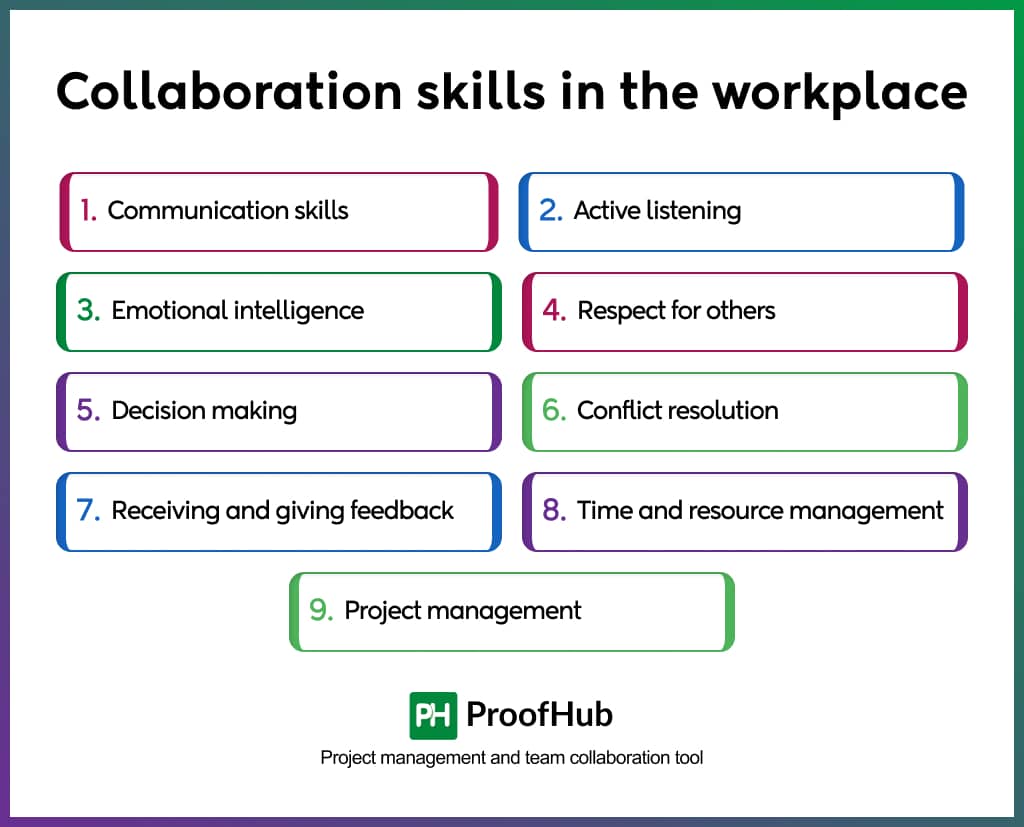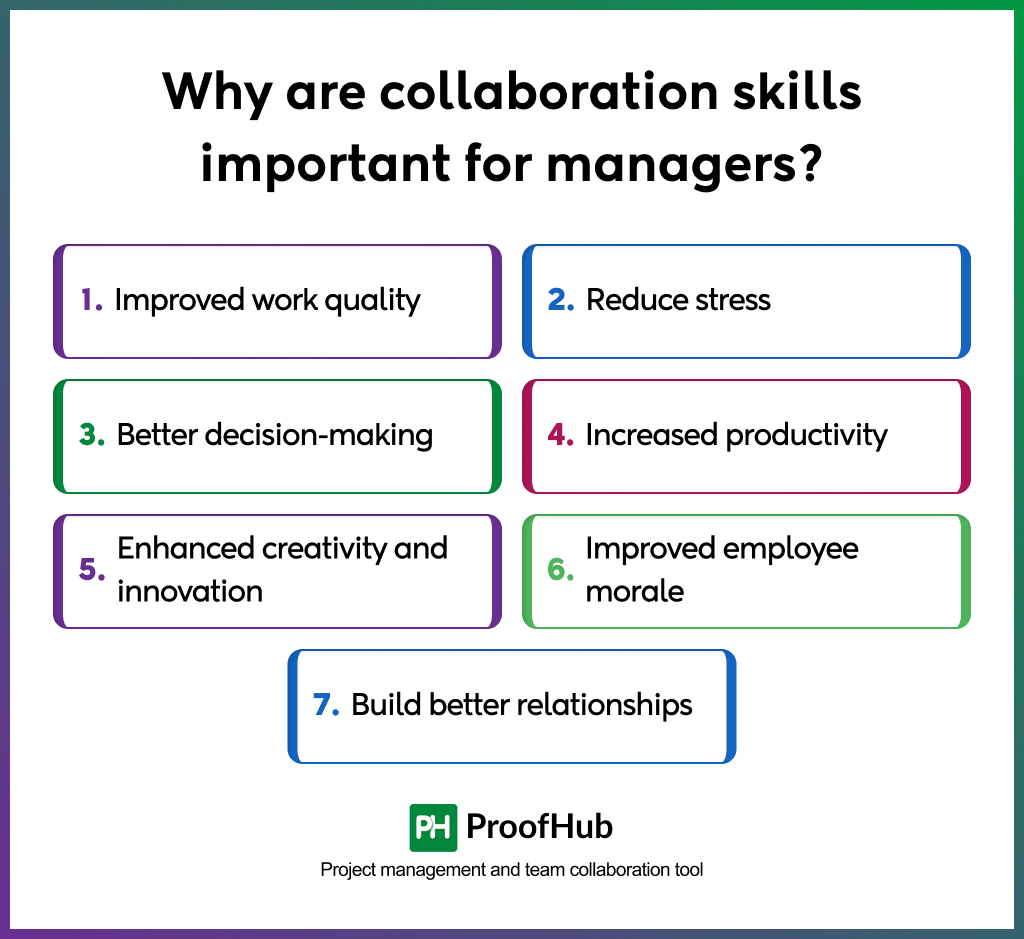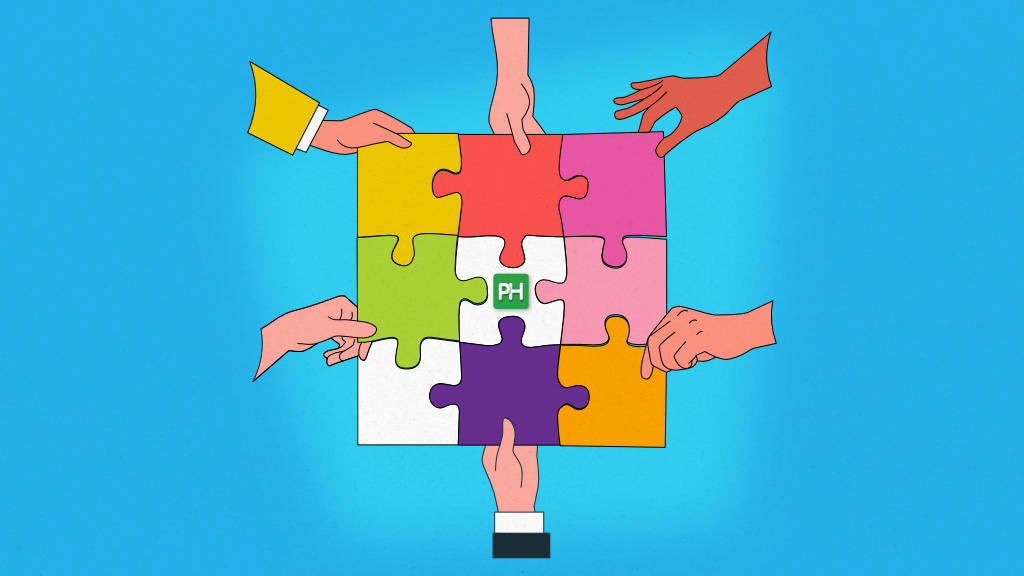Introduction
Most managers assume that collaboration with the team will happen naturally. It is only when a manager is in hot water, they realize the need to work on collaboration skills. Managers often find themselves in this situation at some point in their careers. This is a common experience, but it’s possible to develop and improve collaboration skills to address these challenges effectively.
Collaboration skills are one of the most important soft skills for a manager. This is evident from the fact that 86% of employees in leadership positions blame lack of collaboration as the top reason for workplace failures.
Collaboration skills enable you to work with others easily and effectively. It makes it easy to share information, discuss ideas with others, and understand what others have to say.
In this post, we’ll explore the importance of collaboration skills for managers, highlight the top collaboration skills, and provide tips on how to improve them.
What are collaboration skills?
Collaboration skills are all about your ability to work with others. It allows you to effectively communicate your message, understand others’ perspectives, share information, brainstorm ideas, and resolve conflicts to work towards a common goal.
All workplaces require collaboration to work effectively in a group. Therefore, companies look at collaboration skills as one of the top skills when hiring employees. It makes you a good team member and a leader.
Examples of collaboration skills in the workplace
Collaboration skills include a group of soft skills that make it easy to work with others.

Here is the set of top soft skills you need to ensure smooth, flawless, and frictionless collaboration with the team:
1. Communication skills
Collaboration cannot occur without communication. A manager needs to have strong communication and collaboration skills. It allows you to share your ideas clearly and concisely so that everyone can understand.
As communication can occur in two ways: written and verbal, you should also have strong writing skills along with good verbal communication.
Especially, in remote working environments, it helps you in effective written communication via email, chat, and other means.
How to improve
- Listen first to understand others
- Do not assume anything. Ask for clarification. Over-communicate for clarity
- Enroll in professional communication skills improvement courses
Read more: Best internal communication tools to boost collaboration
2. Active listening
Collaboration cannot happen without listening to others. A manager should have good listening skills. It provides you the opportunity to understand what others have to say and their perspectives.
Be an active listener. This helps you build better relationships with your team and it also plays a great role in resolving conflicts, a critical aspect of effective collaboration skills.
How to improve
- Pay full attention to the speaker and listen to others patiently
- Listen to understand. Most people are busy creating responses in their minds while listening to others
- Validate and acknowledge the speaker
- Minimize the distractions. Avoid using mobile or laptop, and talking to others while listening to a speaker
- Ask for clarification and rephrase what the person says to ensure you are on the same page
3. Emotional intelligence
Emotional intelligence is the ability to understand & manage your emotions and understand other’s emotions & react accordingly. This helps you highly in team handling with adversity. You can better understand each team member’s emotions, how they behave, and how to respond to them.
Especially, in today’s workplace, where employees have become more conscious about how their managers treat them. It is very important to develop emotional intelligence.
How to improve
- Avoid reacting to situations when high on emotions
- Do not take criticism personally and get offended
- Compassion for others
- Patience and resilience
- Focusing on the larger good
4. Respect for others
It is one of the most desired skills in the workplace for a manager while handling a team. You should respect team members, their boundaries, and their skills. It helps you build a professional relationship with your team.
Above all, when you show respect for your team members, your team respects you back and listens to you. It makes it easy to handle the team as you gain the trust of your team.
How to improve
- Watch your tone. Be polite
- Avoid interrupting when the other person is speaking
- Respect differences in beliefs and opinions
- Think before you speak and how it is going to impact other people
- Lend a helping hand or ear if possible
5. Decision making
“You cannot make progress without making decisions.” – Jim Rohn, American entrepreneur and author
A manager needs to make a lot of decisions every day, such as hiring a candidate, planning a weekly update meeting, and so on. You need to have good decision-making and leadership skills to collaborate effectively.
For that, you need good analytical thinking skills. It is the ability to assess information, identify problems, and find solutions. It suggests you can weigh all the options and make the right decision.
How to improve
- Listen patiently to understand others
- Work on your analytical skills
- Focus on the desired outcome
- Set deadlines
- Make unbiased decisions
Check out the analytical thinking best practices of Fortune 500 Leaders.
6. Conflict resolution
Conflict resolution is part of a manager’s day-to-day life. A manager has to work with people of different personalities, working styles, and communication preferences. Thus, you need to have good conflict resolution skills to handle team conflicts.
It includes the ability to resolve conflicts using dialogue, listening to everyone patiently, finding solutions, staying unbiased, and making strong decisions.
How to improve
- Avoid blaming others
- Work on understanding others’ perspectives
- Don’t talk behind people’s backs
- Look for solutions
- Use a polite tone and be compassionate
You can learn more about how to handle a disagreement on your team.
7. Receiving and giving feedback
Sharing feedback is one of the main responsibilities of a manager. It is an important part of collaboration with the team. For example, if you need improvement in the performance or behavior of a team member, feedback is the only way.
You should be able to give clear, actionable, and proper feedback. You should know how to give feedback without hurting the sentiments of others.
Not only that, but you should be good at receiving feedback from the team. It requires open-mindedness and attitude to improve to receive feedback positively.
How to improve
- Be specific while giving feedback
- Remember the motive. It is not about the person. It is about the performance
- Do not lecture. Be empathetic. Give the other person a chance to speak
- You can learn more here about how to give feedback.
8. Time and resource management
It is the responsibility of a manager to complete projects within budget and time. Time management and resource management allow you to utilize your time and resources efficiently and effectively at the workplace.
For effective time management, you should be able to create a plan, set priorities, set up smart goals, set deadlines, and keep track of progress.
For effective resource management, you should know the project demands, and resource availability, and use resource management software.
How to improve
- Create a to-do list
- Learn the prioritization techniques
- Use time management and resource management techniques
You can check out RMI’s resource management training classes to learn more about resource management.
Also, check out the top time management courses to improve your time management skills.
9. Project management
Last but not least, a manager needs to have strong project management skills for effective project collaboration. If you are not able to plan a project properly, it is hard for the team to follow the plan and work on the project.
Top project management skills include project planning, resource management, budget planning, risk management, and knowledge of project methodologies and tools.
How to improve
- Expand your project management knowledge
- Take project management training courses
- Receive feedback from the team and senior managers
- Use project management tools
You can explore the best project management courses to learn project management.
Read more: Best project management tools (Buying guide)
Why are collaboration skills important for managers?
A manager is responsible primarily for two things: managing people and managing projects. To perform both duties well, you need good collaboration skills.

Have a look at the importance of having good collaboration skills.
1. Improved work quality
Good collaboration skills allow you to communicate the message to the team in a clear way. It helps you to effectively explain the project requirements, everyone’s roles and responsibilities, and company objectives.
This results in a clear understanding of what one has to do and how it impacts the team’s performance, team cooperation, project goals, and company objectives. This results in improved work quality.
2. Reduce stress with effective task delegation
Good collaboration skills allow you to interact with team members and know them better. This helps you in effective task delegation as you know about the strengths and weaknesses of every team member.
This in turn ensures that resources are fully optimized and functioning at their best potential. It also takes pressure away from you and reduces stress.
3. Better decision-making
Good collaboration skills mean you can communicate with others well. It helps a lot in decision-making. By collaborating with the team, you can collect input from various resources. This helps bring an outside perspective to the situation and is helpful in critical decision-making.
4. Increased productivity
Effective collaboration makes it easy to share information, discuss ideas, and work towards a common goal with a team. This creates a collaborative workplace culture that allows teams to work efficiently resulting in increased productivity.
5. Enhanced creativity and innovation
Effective collaboration means the free flow of information and ideas. When people working on projects collaborate effectively, it gives them access to the knowledge and experience of other team members working on projects. It helps you learn from one another and come up with new ideas.
6. Improved employee morale
Good collaboration skills help you build a strong relationship with employees. This results in higher engagement levels with employees. Team members feel valued and respected when their managers listen to them. This results in improved employee morale and happy and engaged employees.
7. Build better relationships
Effective collaboration allows a manager to know their team better. When you know about the team’s strengths and weaknesses, it helps build trust in the team’s abilities and a stronger relationship with team members. This helps in creating a great work culture at the workplace.
Do you know that 56% of employers use online collaboration tools to communicate with employees?
Find out how a project management and team collaboration tool can help you improve collaboration with the team.
Also read: Cross-functional collaboration: Benefits & tips to improve it
ProofHub- an all-in-one project management and team collaboration tool
ProofHub is an ultimate productivity tool that provides a centralized platform to improve collaboration with teams. It brings all your projects, teamwork, and team communication to one place.
Here is how ProofHub can help you improve team collaboration:
- Bring all projects to one place: ProofHub provides a centralized task management platform that allows you to create, delegate, and track tasks from one place. You can keep a bird’s eye on everyone’s work.
- Streamline team communication: ProofHub provides you with multiple communication channels to streamline team communication such as built-in chat, task comments, and project discussions. It helps you fill communication gaps, boosting team collaboration skills.
- Document sharing with ease: ProofHub allows you to attach files directly to tasks from computers and cloud-storage devices. It makes it easy to find, access, and share documents.
- Feedback and approvals: ProofHub provides you with an online proofing platform that makes it easy to review and edit digital assets. It provides you with a system to share feedback with the team.
Final words: collaboration is the key to a successful workplace
The idea behind the concept of collaboration is that when people work together on a project, they are more effective than working alone. But companies with poor collaboration have manifested exactly the opposite of that.
Poor collaboration leads to poor work efficiency. Even worse than working alone because it leads to rework, miscommunication, and unnecessary wastage of time.
A manager just needs to keep in mind that the goal of collaboration is to be more effective than working alone. It helps you improve team productivity, increase work quality, and make it easy to work together.
On top of that, effective collaboration leads to a higher level of engagement. It creates a positive work environment that results in happy employees.
FAQ’s
What are the 5 principles of collaboration?
According to J. Ibeh Agbanyim, founder of Focused Vision Consulting, the 5 principles of collaboration are Applying Trust, Respect, Willingness, Empowerment, and Effective Communication.
How to develop collaboration skills?
The best way to develop collaboration skills is to practice. You can learn from various resources and take formal training. But without practicing, it is hard to develop collaboration skills.
Are collaborative tech tools enough for developing collaborative skills?
A collaboration tool cannot fix a poor collaboration culture, but it definitely helps you improve collaboration and communication. Almost every company with a good collaboration and communication culture uses collaboration tools in the workplace.

